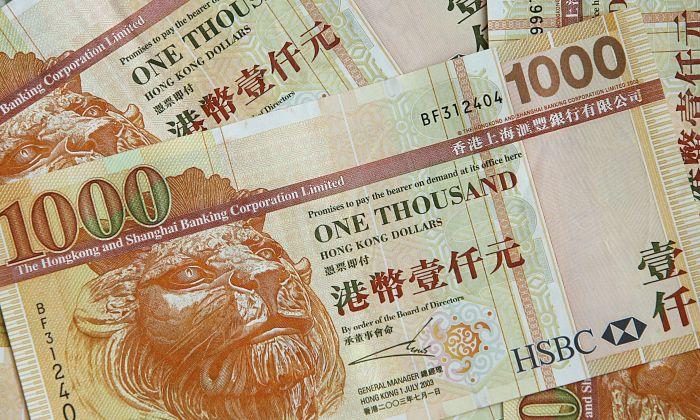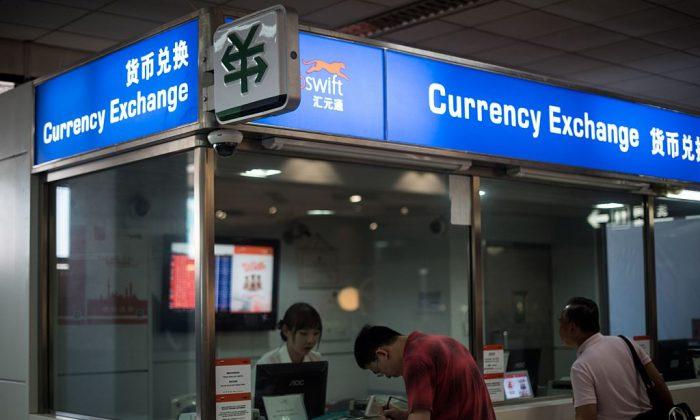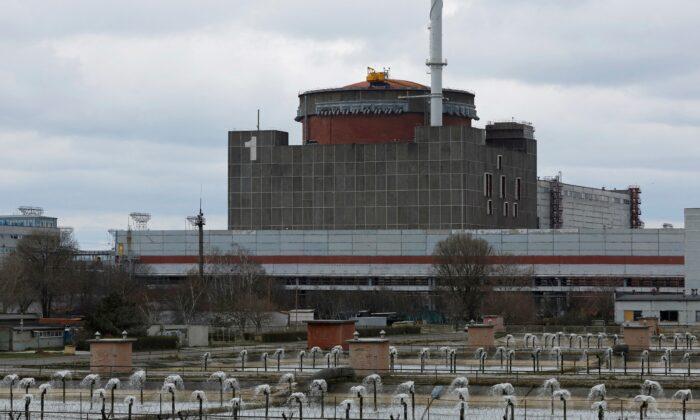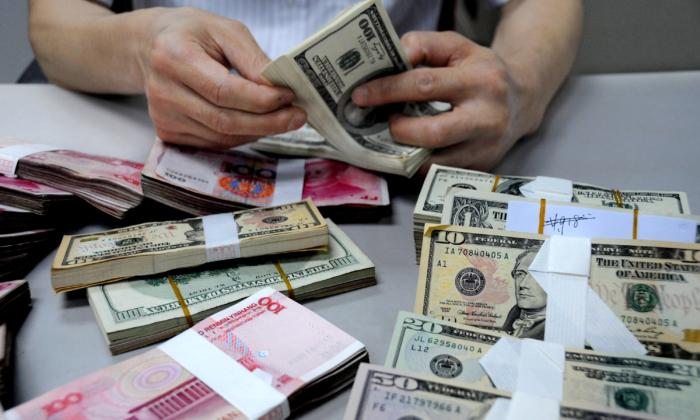On Aug. 5, Hong Kong’s central bank
bought the largest amount of its currency in one day since May 12—HK$14.161 billion (about $1.80 billion)—to stop it from weakening further and breaking its peg to the U.S. dollar.
On July 28, after the U.S. Federal Reserve announced a rate hike of 75 basis points, the Hong Kong Monetary Authority (HKMA), the city’s central bank, followed suit and
raised its base rate upward by 75 basis points to 2.75 percent.
Since Oct. 17, 1983, Hong Kong has
adopted the Linked Exchange Rate System (LERS), allowing the HKMA to stabilize exchange rates from the U.S. dollar to the HKD between 7.75 and 7.85, also known as the Convertibility Undertaking (CU). As a currency pegged to the USD, the HKD’s strong-side CU is 7.75 to one U.S. dollar, and the weak-side CU is 7.85.
To cope with the aggressive U.S. dollar rate hikes since May and the low market demand for HKD, the HKMA has been requested to buy over HK$201.6 billion (about $26.2 billion) from note-issuing banks to stabilize the exchange rate of HKD.
“As the U.S. raised interest rates and the Hong Kong dollar and U.S. dollar interest rate differentials widened, market participants naturally saw incentives to conduct carry trades,” Eddie Yue, the chief executive of the HKMA,
said on July 28. “Coupled with [the] subdued local demand for Hong Kong dollars in recent months, the weak-side Convertibility Undertaking has been triggered multiple times since May.”
Since March, the Fed has raised the federal funds target range four times by a total of 225 basis points. As of Aug. 5, the HKMA has made 29 moves to buy HKD and sell USD according to the LERS, costing a significant amount of foreign currency to aid the local one.
Despite the seemingly unsustainable costs of stabilizing the HKD, Hong Kong’s Financial Secretary Paul Chan told South China Morning Post (SCMP) on July 28 that the HKD would never be unpegged from the USD.
In response to Chan’s comment, Albert Song, a current affairs commentator and expert on the Chinese financial system, told The Epoch Times that “The Fed may stop raising interest rates in September. And the Hong Kong government intends to [defend the currency peg] until that time. Fewer exchange rate fluctuations will also reduce the pressure on Hong Kong’s financial system.”
“However, it is a financial war possibly leading to exhaustion of foreign currency reserves as the HKMA has to keep selling USD and buying HKD to stabilize the exchange rate,” Song added.
On August 5, the
closing aggregate balance (AB) dropped to HK$129.293 billion (about $16.8 billion). In comparison, the AB on July 22 was HK$165.259 billion (about $21.1 billion).
“The aggregate balance refers to the sum of the balances in the clearing accounts maintained by the banks with the Hong Kong Monetary Authority (HKMA), representing the interbank liquidity,” as
defined by BNP Paribas, a France-based commercial banking group. The AB directly relates to the exchange rate of HKD to USD.
When market demand for HKD decreases and the HKD exchange rate slides to the weak side of the CU (7.85 HKD per USD), in this case, the HKMA—upon bank requests—commits to sell USD and purchase HKD from banks. Consequently, the AB will drop, and the HKD interbank rates will rise, thus stabilizing the HKD exchange rate within the CU.
Currently, the market demand for HKD is low, and the exchange rate of HKD lingers around the weak side of the CU band, which means that funds will continue flowing out of the HKD system, and the HKMA will have to keep the pace of buying HKD to defend the currency peg.
Mortgage Rates Rise
Following the Fed’s interest rate hikes, the HKD interbank rates will continue to rise and gradually track the USD interbank rates. Banks must adjust the deposit and lending interest rates according to their funding cost structures and other relevant considerations.HKMA Chief Executive Eddie Yue said on July 28 that “the public should carefully assess and manage the relevant risks when making a property purchase, taking out a mortgage, or making other borrow decisions.”
Meanwhile, the Executive Director and CEO of Hong Kong Mortgage Corporation Limited, Raymond Li,
recommended a fixed rate mortgage scheme to the public, according to HKMA.
“In recent months, market participants have been closely following global developments, particularly the pace of interest rate hikes in the U.S. … If long-term interest rate risk is a key concern to them, an option worth considering is the Fixed Rate Mortgage Scheme,” Li’s article said.
In a press
Q&A session on July 28, the city’s Financial Secretary Paul Chan said the Fed’s continued interest rate hikes are not conducive to economic recovery, adding that “the external economic situation will continue to worsen [and] the export performance of Hong Kong will naturally be affected.”
“As to the impact of [an] increase in interest rate on the property market, when [the] interest rate increases, the mortgage repayment of homeowners will increase,” Chan added.
At the end of July, Hong Kong’s foreign currency reserves, including unsettled foreign exchange contracts, amounted to
$440.1 billion, a significant decrease from the
$492.5 billion at the end of January.






Friends Read Free